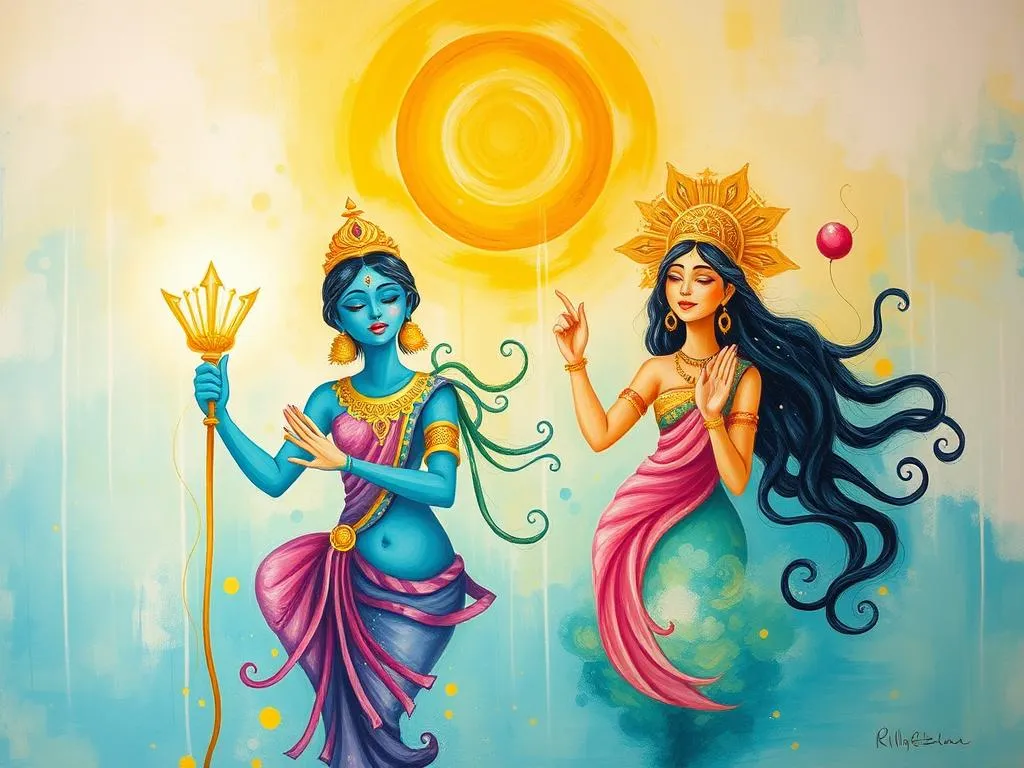
Introduction
Dreams have long captivated the human imagination, serving as a portal to our subconscious, revealing hidden fears, desires, and insights. Among the myriad of symbols that may appear in our dreams, deities, particularly Telugu goddesses, hold a significant place in the cultural psyche of many individuals. These divine figures, deeply rooted in the traditions and beliefs of the Telugu-speaking regions of India, often embody complex meanings that can illuminate our waking lives. Understanding the symbolism of Telugu goddesses in dreams can not only provide a glimpse into one’s inner world but also offer guidance on personal growth and spiritual awakening. This article delves into the symbolism, variations, and real-life connections of dreaming about Telugu goddesses, inviting readers to explore their own interpretations.
Symbolism and Meaning
Dreaming of Telugu goddesses can evoke a wide array of emotions and meanings, depending on the specific goddess and the context of the dream. In Hindu mythology, goddesses like Durga, Lakshmi, and Saraswati are revered for their distinct attributes and powers. Each goddess symbolizes different aspects of life—Durga represents strength and protection, Lakshmi embodies wealth and prosperity, while Saraswati signifies knowledge and wisdom.
The presence of these deities in dreams often indicates a call to harness their respective qualities in practical life. For instance, encountering Durga in a dream might suggest that the dreamer is facing challenges and needs to tap into their inner strength. Conversely, dreaming of Lakshmi could signify a forthcoming period of prosperity or the need to focus on financial matters. The goddess Saraswati may appear when one is seeking clarity or guidance in their educational or artistic pursuits.
Moreover, the context of the dream plays a crucial role in its interpretation. For example, if a dreamer finds themselves praying to a goddess or receiving blessings, it may symbolize a desire for support in their waking life. Conversely, if a goddess appears in a more menacing form, it could signify feelings of inadequacy or fear of failure. The emotional tone of the dream—whether it feels comforting, unsettling, or empowering—can further shape its meaning.
It’s important to consider personal and cultural backgrounds, as these factors can influence one’s connection to the symbols presented in the dream. For someone deeply rooted in Telugu culture, the appearance of a goddess might evoke strong feelings of reverence and familiarity, whereas for someone unfamiliar with these traditions, the symbolism may not resonate as deeply.
Key Scenarios and Variations
The interpretation of dreams involving Telugu goddesses can vary significantly based on the scenarios presented. One common scenario is the dreamer receiving a divine message or guidance from a goddess. In such cases, this could symbolize a need for introspection and the pursuit of spiritual growth. It might indicate that the dreamer is at a crossroads in life and needs to listen to their intuition or seek wisdom from within.
Another variation is the dreamer witnessing a ritual or ceremony dedicated to a goddess. This could reflect a longing for community, tradition, or a connection to one’s roots. It may suggest that the dreamer is seeking a deeper understanding of their cultural identity or is in need of spiritual nourishment. Participating in such a ritual within the dream could signify the dreamer’s desire to reclaim lost traditions or to foster a sense of belonging.
Dreams featuring multiple goddesses can also carry unique interpretations. For instance, if a dreamer sees both Lakshmi and Saraswati, it might suggest a balance between material wealth and intellectual pursuits. This duality could indicate that the dreamer is being encouraged to pursue both financial stability and personal growth, recognizing that both elements are essential for a fulfilling life.
On the other hand, if a goddess appears in a transformative state, such as changing from one form to another, this might symbolize personal growth or a significant life transition. This transformation could indicate that the dreamer is evolving and shedding old beliefs or behaviors, making way for new opportunities and experiences.
In dreams where the goddess appears angry or vengeful, it’s crucial to examine the underlying emotions. This scenario might represent unresolved guilt, anxiety, or fear in the dreamer’s life. It could serve as a warning to confront these feelings rather than suppress them, urging the dreamer to take responsibility for their actions and seek reconciliation.
Real-Life Connections and Takeaways
Connecting dreams featuring Telugu goddesses to real-life situations can offer profound insights into one’s personal journey. Reflecting on the emotions experienced during the dream is essential. Did the dream evoke feelings of joy, fear, or empowerment? Understanding these emotions can help the dreamer identify areas in their waking life that may need attention or transformation.
For those who dream of Durga, it may be time to assess personal challenges. Are there obstacles in the dreamer’s life that require courage and resilience? This dream could serve as a reminder to embrace inner strength and confront difficulties head-on, rather than shying away from them. Engaging in activities that promote self-confidence, such as physical exercise or learning new skills, can be beneficial.
If a dreamer is visited by Lakshmi, it might be a sign to focus on financial matters or to embrace an attitude of abundance. Practicing gratitude and acknowledging the blessings in one’s life can amplify feelings of prosperity and attract positive energy. Setting financial goals or exploring new income opportunities could also be practical steps to take after such a dream.
Dreams featuring Saraswati might inspire individuals to delve deeper into their creative or intellectual pursuits. If the dreamer feels a call to learn or create, they should consider dedicating time to education or artistic endeavors. Joining workshops, enrolling in classes, or simply setting aside time for creative activities can foster personal growth and fulfillment.
Moreover, maintaining a dream journal can enhance self-reflection. Writing down dreams and analyzing the recurring themes or symbols can help deepen the understanding of personal motives and desires. Over time, this practice may reveal patterns that can guide decision-making and personal development.
Encouraging individuals to engage in meditation or prayer can also be beneficial, particularly for those who feel a strong connection to spirituality. These practices can foster a deeper connection to the divine and encourage the exploration of one’s spiritual path.
Finally, it’s essential for dreamers to remember that the interpretations of their dreams are ultimately personal. The symbolism of Telugu goddesses may resonate differently for each individual, shaped by their experiences, beliefs, and cultural backgrounds. Engaging in a dialogue with oneself about these dreams can lead to greater self-awareness and empowerment.
In summary, dreaming of Telugu goddesses invites individuals to explore their inner landscapes, confront challenges, and embrace their strengths. By reflecting on the symbolism, variations, and personal connections of these dreams, readers can glean valuable insights that promote growth and transformation in their waking lives. As each dream unfolds, it serves as a reminder of the rich tapestry of our subconscious, urging us to listen, reflect, and evolve.







